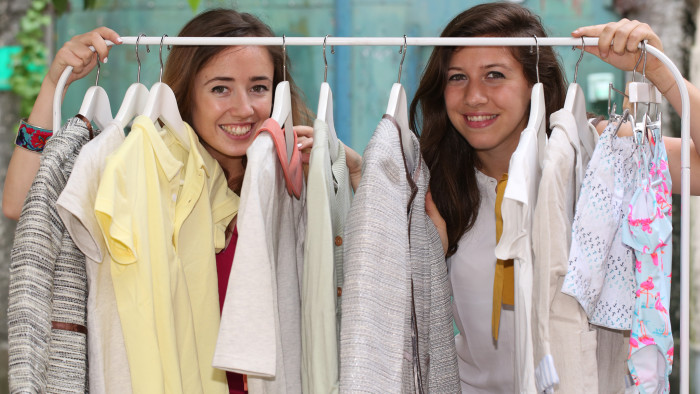Chinese economy attracts graduates keen for scale

Simply sign up to the Business education myFT Digest -- delivered directly to your inbox.
The enthusiasm of Fanny Gobé and Maria Paloma Fuentes is palpable. Riding high on the initial success of their summer collection of children’s clothes, the two French business graduates are planning their next sales moves, both online and through multi-brand boutiques.
The chic edge-to-edge jackets, Bermuda shorts and berets would probably look at home on the rails of Printemps or Galeries Lafayette. Yet their start-up company, Mini Bobi, is not based in Paris. It is in Suzhou, a couple of hours’ drive from Shanghai.
The two Skema alumnae are among the growing number of French graduates who are looking for their first job in China. One catalyst has been the rush of European business schools to establish campuses in China, run joint degree programmes with Chinese universities and set up internship programmes in Beijing and Shanghai.
What is more, the growth in the Chinese economy, together with the low cost of entry in cities such as Shanghai, has resonated with graduates worldwide who want to be entrepreneurs.
The real advantage of China, though, is simply the scale, says Ms Fuentes. “The opportunities are much more attractive here than in France. If you come up with a new idea it will be really big.”
The Mini Bobi clothing range, which combines Parisian style with the stretchy materials and copious waistbands needed by the increasing number of obese children in China’s cities, was the brainchild of Ms Gobé.
After studying fashion and business in Lille and Shanghai, Ms Gobé completed a gap year in the US and decided to write her thesis on the plus-size market.
“In this thesis I made a comparison between the market in the US and China. [Previously] I wasn’t aware of this market,” she says, adding that in China there are 120m obese children under the age of 18.
In the city of Shanghai more than 18 per cent of children at primary school are overweight — the same percentage as in the US, she says. “I was surprised when I realised [this was the case],” she says.
Enthusiasm for all things Chinese spreads well beyond entrepreneurs, says Nick Sanders, director of the Masters in International Business at Grenoble Graduate School of Business. Of the section of the MIB class that spent a year in Beijing, many are enthusiastic about working there.
“Ninety per cent of them actually want to stay in China,” says Mr Sanders, although practically, only between a quarter and a third will get their first job on graduation in the country. A further 50 per cent will be employed working with China in some capacity, adds Mr Sanders.
“They tend to be employed where there needs to be an understanding between China and another country.”
Entrepreneur Matthieu David-Experton, an Essec graduate, who also studied for a second degree at the Guanghua school at Peking University, is now on his second business venture in China — he sold the first, a packaged gift business, after 18 months.

His three-year-old market research company, Daxue Consulting, has offices in Beijing and Shanghai, with a third office planned in Hong Kong. It has 15 employees but by the end of the year he plans to have a staff of 20 and revenues of Rmb7m ($1.1m).
“What I have always done in China is take a model that works well in Europe, then adapt it.” Most of his clients to date have been international companies looking for information on the China market — western nursing home groups, eager to take advantage of the changing Chinese demographics, have been strong clients. That is changing. “Chinese companies are now looking for better information on their
competitors.”
For Mr David-Experton there are clear advantages to working in China, particularly the flexibility and speed to market. Products can be designed and developed in just a few days, he says. “I had the feeling you couldn’t get these things done in this timescale in Europe.” It means entrepreneurs can get a product to market without having to raise too much money, he adds.
But he warns that the Chinese business environment is not plain sailing. “They [prospective entrepreneurs] need to come here and see what is happening. A lot of people come here with ideas that don’t fit with the market.”
It is a message echoed by Manmeet Singh, senior affiliate lecturer at EMLyon Business School, who has worked in China for the past 13 years. “This market has a learning curve, it has a learning curve for everybody. Even the 50-year-old chief executives of multinationals have a learning curve. They can come here and get their butt kicked.”
European entrepreneurs are taking a double risk he says: starting a business and setting up in an alien environment.
He also warns that much of the “low-hanging fruit” available to French entrepreneurs a few years ago no longer exists. He cites the example of those who want to set up a wine importing business in China: now the tables are turned and Chinese companies are buying vineyards around the world.
But there are some positive elements about China for European entrepreneurs, he says.
“There’s a lot of money available in the market for the right product. They [the Chinese] are agnostic on the origins of their entrepreneurs.”
And the enthusiasm for start-up careers in China are still strong among French business students, he says. “A good 10 per cent of the class [in China] approach me with ideas.”
Mr Singh is heavily involved in Shanghai’s Chinaccelerator, which gives support to both Chinese and international entrepreneurs. Though popular in the US and Europe, incubators are more novel in China.
It was following Skema Business School’s tie-up with a local Suzhou incubator in 2013 that the founders of Mini Bobi decided to locate their company there. Now they are distributing their range of 30 China-manufactured clothing items in Hangzhou and Suzhou as well as Shanghai.
With a monthly income so far of around Rmb3,000, the founders are looking to wider distribution to increase sales and are now selling online through Taobao, China’s answer to Amazon or eBay, founded by the Alibaba Group. They are also talking to schools about designing more generous-sized school uniforms.




Comments